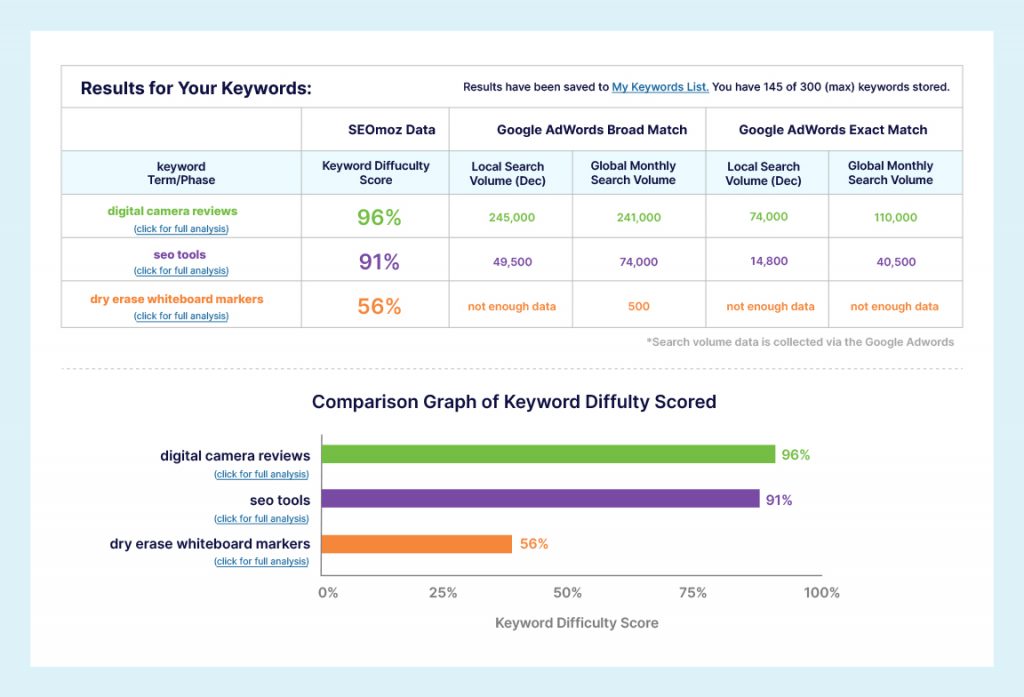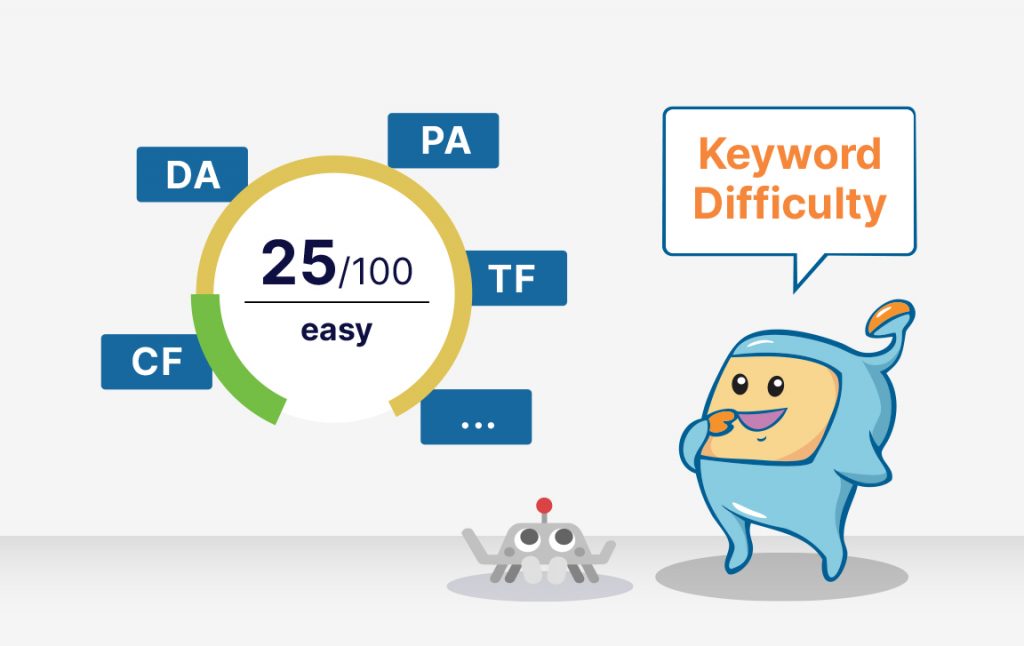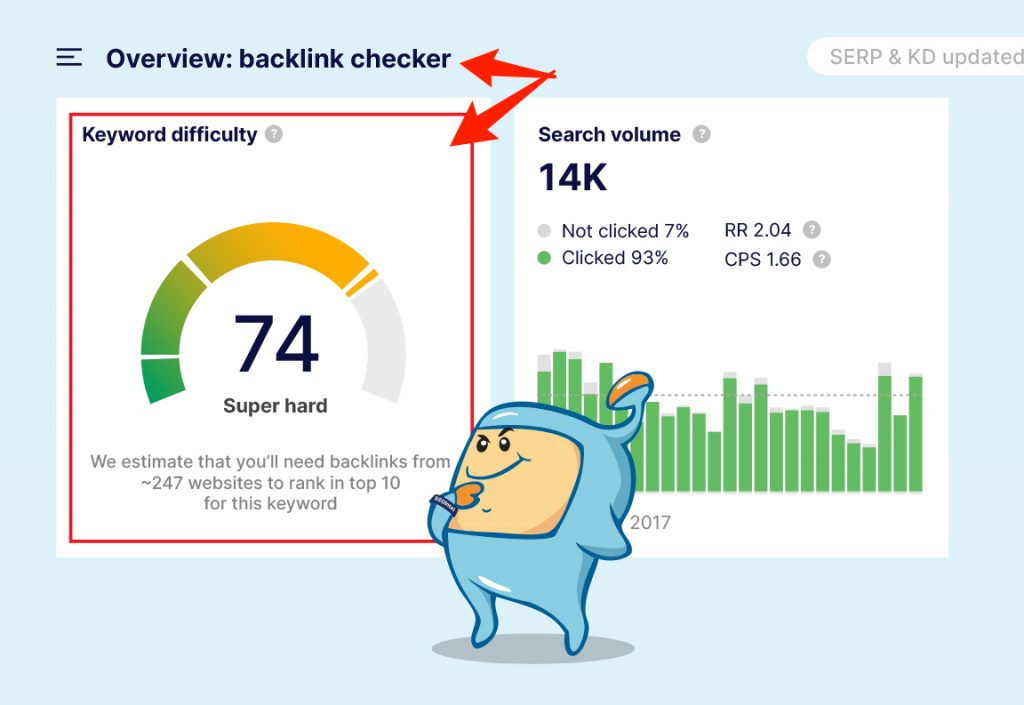Keyword difficulty is a crucial factor to consider when selecting keywords for your SEO marketing strategy. It refers to the level of competition you are likely to face in ranking organically for a particular keyword in search engine results.
Determining keyword difficulty involves assessing various factors, such as the number of websites targeting the keyword, the authority of those websites, and the quality and relevance of their content.
A high keyword difficulty indicates intense competition, making it challenging to achieve a favorable ranking.
Conversely, low difficulty keywords present opportunities for easier visibility and higher chances of ranking well. Striking a balance between highly competitive and less competitive keywords is essential to optimize your SEO efforts and maximize your website's visibility in search engine results pages.
Here is an overview of what you will learn in this article:
Keyword difficulty is a method of determining how difficult it is to rank in Google's organic search results for a specific term. It is also known as Search Engine Optimization difficulty (SEO difficulty) or keyword competitiveness.
A lot of factors influence the difficulty of a keyword including domain authority, page authority, and content quality.
The complexity of a keyword is an important factor to consider while conducting keyword research
Keyword competition, keyword difficulty metric, or keyword difficulty score is a metric that indicates how difficult it will be to rank for a certain term. The amount of competition for a term varies depending on the keyword's popularity and the industry's competitiveness which affects ranking factors.

But how can you determine how competitive a keyword is? Search marketers calculate the amount of time and effort required to achieve top rankings for specific keywords from a list of keywords or search queries and keyword suggestions.
In an SEO strategy or SEO campaign, determining keyword difficulty is crucial.
Here are a few reasons why marketers and SEO experts should consider this approach in order to rank keywords.
If you want to rank high for your target keywords, you'll need to consider keyword difficulty.
However, it should only be a small part of your overall SEO strategy.
Determining keyword difficulty provides insights into the following factors:
If you're a well-known firm with high search rankings for a number of competitive keywords, you should focus on search volume instead.
If you have a profitable website with high domain authority, there's a good chance you already rank well for difficult keywords.
As a result, you'll want to focus your efforts on reaching the most feasible individuals, which means concentrating on the most popular terms.
On the other side, new and rising businesses should pay more attention to keyword difficulty. To start your SEO Effort, consider creating a keyword list. You may use a keyword research tool to check the keyword difficulty for various terms and then decide which keywords to gun for.
If you're a small business that's just starting, ranking for high-difficulty keywords can be difficult, you need to understand that ranking your site for such terms takes time and it would be best to come up with a SEO strategy that targets a combination of medium and low competition money terms.
For help with keyword research and choosing the right terms for your site and pages, check out our Keyword Research article.

The domain authority of your website has a big impact on your search ranking success.
If your website has a high domain authority, you'll have a better chance of ranking for more difficult keywords.
The same is true on the other end of the spectrum. It will be more difficult to rank for challenging keywords like high-volume keywords if your domain authority is low, so it is better to find other keyword opportunities with low-competition keywords.
The reason why an internet user searches for anything in the first place is referred to as the searcher's intent. Google gives it a lot of weight and it's also an important aspect of keyword difficulty.
As you work on your SEO strategy, keep in mind what your searchers are looking for. Consider why your target audience would use a given keyword and what action you want the searcher to take.
The content on your website must be of high quality. Google's algorithm is now better than ever at spotting high-quality websites.
It's no surprise, then, that keyword difficulty is driven by content quality.
It's critical to understand that high-quality writing isn't the sole factor to evaluate. Great content also includes effective images, data points, relevancy, and trustworthy links.
The strength of a keyword's competitors has a significant impact on its difficulty.
If your brand-new website is targeting the same keywords as a well-established company with a high DA, ranking for those terms will be more difficult.
The high-difficulty keywords you're seeing in your keyword research are presumably difficult because they're already being ranked by other reputable companies.

Keyword difficulty is calculated based on these three factors:
This is taken into account when assessing keyword difficulty because it is one of the most essential search engine ranking criteria. Pages with high-quality, relevant information, score well since the ultimate goal of search engines is to provide consumers with the most useful and relevant results.
As a result, the material on your page should be relevant to your target audience and your keyword selection should reflect that.
The amount and quality of backlinks, as well as the number of referring websites, are important factors that determine a keyword's difficulty score. Pages with a diverse set of high-quality backlinks perform well, making it tough to compete for the keywords they target.
Domain authority is akin to a website's reputation in terms of how relevant and valuable its content is for a specific subject or industry. The higher a site's domain authority, the more it is recognized as an expert content provider in its field.
Because websites with high domain authority rank higher for the keywords they target, these keywords will have a high difficulty score. As a result, while calculating the keyword difficulty score, the domain authority of websites that use that keyword is taken into account.

Keywords that have a high difficulty have very high competition. It means that a lot of other sites are competing to get to the top of the search results for this particular keyword.
If you are going to target high difficulty keywords, then you would have to invest in your SEO campaigns, from making sure your content is relevant to your keyword, your onpage is great, plus you would also need to invest in high-quality link building.
It is hard to see immediate results from these types of keywords. It needs work and sometimes, it can take months, even years to see results.
It is more viable and profitable to try to rank for these keywords. There will almost always be a lot of competition but not so much that it will be impossible to compete.
As a result, these are your best options when it comes to selecting keywords to target because you have a realistic chance of competing for them. They also have a high volume of searches, so concentrating on them is worthwhile.
These are the keywords that have the least difficulty and are the most straightforward to rank for. On the other hand, these terms rarely have high and constant search volumes. You've struck gold if you can find low-difficulty phrases with high search volume keywords.
This is precisely what specialty firms do. They focus on specialized, often long-tail keywords that are most relevant to their industry. There isn't much competition on the SERP because these are specialist terms.

To achieve success, how do you incorporate keyword difficulty into your SEO strategy?
The following are some basic guidelines to follow:
If the search traffic is large, the prospective conversion rate is high, and the ROI is worthwhile, then there is no need to be hesitant to handle content with high keyword difficulty.
On the other hand, if the search volume is minimal and profit potential is limited, I would never contemplate pursuing a keyword with severe difficulty.
When developing a content strategy, keyword difficulty is undoubtedly a consideration, but it is only that - a factor and keyword difficulty is only one part of the equation.
Keyword difficulty is an important metric to consider before selecting your target keywords. It tells you how easy or difficult it is for you to rank for that keyword. The higher the difficulty score, the more difficult it is to rank for that target keyword.
You can also use the keyword difficulty score to sort and filter long keyword lists and then select the best keywords for your business.